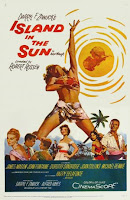Island in the Sun
 Robert Rossen’s 1957 film, Island in the Sun, takes place on the hypothetical Caribbean Island of Santa Marta, a former French plantation colony which is now a country administered by a British elite. At the time of its release, the film was very avant-garde in its exploration of racial tension and interracial romances; in particular, an on-screen interracial kiss between actor Michael Rennie and Dorothy Dandridge attracted a great deal of attention in the U.S.. The plot unravels before a backdrop of lush, beautiful Caribbean scenery and idyllic scenes of island life.
Robert Rossen’s 1957 film, Island in the Sun, takes place on the hypothetical Caribbean Island of Santa Marta, a former French plantation colony which is now a country administered by a British elite. At the time of its release, the film was very avant-garde in its exploration of racial tension and interracial romances; in particular, an on-screen interracial kiss between actor Michael Rennie and Dorothy Dandridge attracted a great deal of attention in the U.S.. The plot unravels before a backdrop of lush, beautiful Caribbean scenery and idyllic scenes of island life.The protagonists of the film are many, both black and white. Maxwell Fleury, played by James Mason, is a white plantation owner’s son with an inferiority complex who plans to run in the upcoming island-wide election. He is suspicious of his beautiful wife Sylvia, whom he suspects of cheating on him with another island man, Hilary Carson, based on a misinterpretation of a few minor coincidences. Fleury’s younger sister Jocelyn (Joan Collins) is being courted by the dashing Euan Templeton, a war hero visiting his father, the island’s governor Lord Templeton. The plot also follows David Boyeur, played by Harry Belafonte, a young ambitious black leader who will run against Fleury in the election and has the vast majority of the people’s support. A romance between Boyeur and Mavis Norman (Joan Fontaine), a white woman from the white elite class, creates a lot of tension in the film. Finally, the film follows the interracial romance between Margot Seaton (Dorothy Dandridge), a black drug-store clerk, and Denis Archer (John Justin), a white aide to the Governor.
Maxwell Fleury’s father Julian is revealed by the local newspaper to have a most unsavoury history; he has a black grandmother. Jocelyn and Maxwell are horrified by the news, as it constrains their social relations on the island. Jocelyn is convinced that Euan Templeton, a future member of the House of Lords in England, will not marry her because she is one-sixteenth black. As a self-perceived compromise to marrying him, she begins to have sexual relations with him and becomes pregnant. Convinced that she must flee and hide her baby because it may be black, she begs her mother for help, at which point her mother reveals that Jocelyn in fact has no black blood because Mr. Fleury is not her father and encourages her to quickly marry Euan. Maxwell, on the other hand, sees the news of his partial blackness as an opportunity to try to gain black votes. One night, as he leaves the Santa Marta Club alone, Maxwell sees Hilary Carson, the man he suspects of having an affair with his wife, and murders him accidentally in his apartment, despite Carson’s denial of the accusation. The rest of the movie follows the Police Chief’s investigation of the murder and Maxwell’s guilt-ridden paranoia about being discovered.
In the end of the film, it is clear that Boyeur has more voter support than Maxwell Fleury, as demonstrated in a scene in which the black crowds begin to drown out Fleury’s speeches with calypso music and cheer hugely for Boyeur. Boyeur is black, one of the people, and so he will win. Maxwell turns himself in to the police, who will try to minimize his sentence. Jocelyn and Euan Templeton leave on a plane for England together, as do Margot Seaton and her love, Denis Archer, both couples hoping to make a future there. David Boyeur and Mavis Norman’s interracial relationship doesn’t work out because Boyeur insists he can never lead his people if he is married to a white woman.
This film portrays the Caribbean as a natural paradise where there are racial tensions, but shows no true interracial violence or hatred. Indeed, the scenes at parties and in the streets of the town always show intermingling blacks and whites. The island’s government seems accepting of black political rights, as shown by the David Boyeur’s ambitions - although his victory is not shown in the film. The line between blacks and whites is predominantly economic in the film; the whites are very rich, while the blacks are labourers on the plantations and fishermen in their villages. There is tension between the races because of history; the black characters’ fathers were slaves on the plantations of the white characters’ fathers. This history is what prevents Boyeur and Mavis Norman from being together. Despite the evident lack of hatred, there is acknowledgement of mild conflict as well as minor racism, as shown in the reactions of the Fleurys to the news of their partial blackness. Overall, however, the film portrays interracial romances and general racial harmony, and creates an atmosphere of imminent political equality for the island’s blacks, which shows an almost naïve hopefulness about the future of racial interactions in the Caribbean. The only doubt about this hopefulness is shown in the casting of the black protagonists, who are essentially white in their dress, manner, and speech. Dorothy Dandridge and Harry Belafonte are both definitely less black than the rest of the black islanders in the film.
